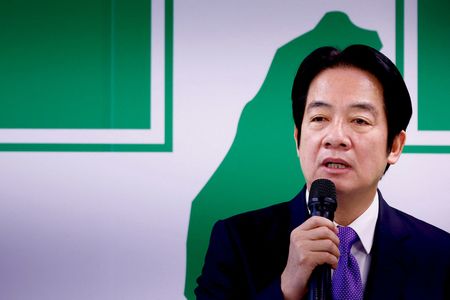 1
1 1
1
TAIPEI (Reuters) – Leading Taiwan presidential candidate William Lai wrote in the Wall Street Journal on Wednesday that he could keep the peace with China if elected, reiterating his willingness for talks without preconditions and a pledge to boost defences.
Lai, Taiwan’s vice president and the candidate for the ruling Democratic Progressive Party (DPP), has consistently led the majority of opinion polls ahead of the January election. President Tsai Ing-wen cannot run again after two terms in office.
In a commentary piece, Lai said that despite the military and economic challenges from China, including China’s almost daily aerial incursions near the island, his top priorities remained pragmatism and consistency.
“I will support the cross-strait status quo – which is in the best interests of both the Republic of China, as Taiwan is formally known, and the international community. I will never rule out the possibility of dialogue without preconditions, based on the principles of reciprocity and dignity,” he added.
Lai said he would continue with Tsai’s plan to boost Taiwan’s defences, such as spending more on the military, adding that these measures reduce the risk of war by raising the stakes and costs for Beijing.
“I will seek greater cooperation with partners and allies, particularly in training, force restructuring, civil defence and information sharing,” he wrote.
Lai is expected to visit the United States next month, according to diplomatic sources, as presidential candidates traditionally do, to discuss their policy agenda.
The United States is Taiwan’s most important international backer and arms supplier.
Tsai has repeatedly offered talks with China but been rebuffed. Beijing views her as a separatist for refusing to accept the Chinese position that Taiwan and China are part of “one China”. She says only Taiwan’s people can decide their future.
Lai angered China in 2018 while he was premier, telling parliament he was a “Taiwan independence worker” and that his position was that Taiwan was a sovereign, independent country – a red line for Beijing.
Both Tsai and Lai say that the Republic of China, Taiwan’s formal name, is already an independent state, despite only 13 countries formally recognising it.
The defeated republican government fled to Taiwan in 1949 after losing a civil war with Mao Zedong’s communists, who established the People’s Republic of China.
(Reporting by Ben Blanchard. Editing by Gerry Doyle)